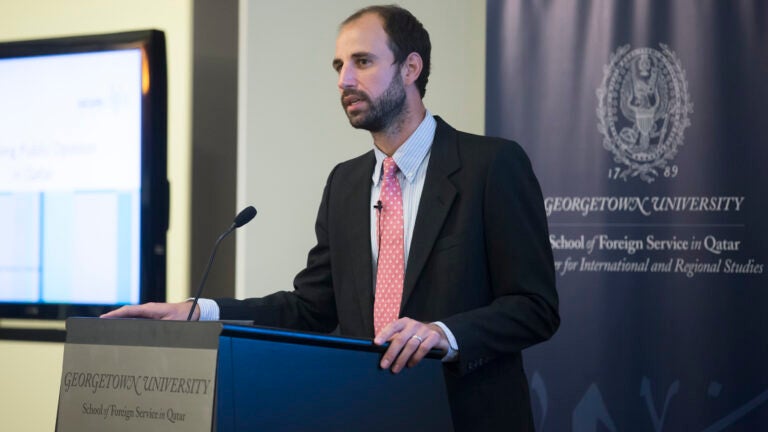Dialogue Series, Distingushed Lectures, Regional Studies
Justin Gengler Monthly Dialogue

Justin Gengler, Senior Researcher at the Social and Economic Survey Research Institute (SESRI) of Qatar University, delivered a CIRS Monthly Dialogue on “Studying Public Opinion in Qatar” on October 13, 2014. SESRI conducts nationally-representative, scientific household surveys of the different social groups residing in Qatar, including the local national population, professional expatriates, and labor migrants. Giving some background to the state of survey research in Qatar, Gengler noted that the in-depth, nation-wide study of public opinion in the Gulf region is still in its infancy. In this context, it is important to think about “what we mean by public opinion or studying public opinion in the Gulf region—especially in a place where people don’t always associate mass attitudes as being part of the decision-making process,” he explained.
Giving specific examples of how responses can change according to context and over time, Gengler argued that there are three general levels of dealing with collected data. A primary level of data analysis is “descriptive” in reporting basic distributions of survey responses to a particular question. A secondary level of data analysis offers a basis for temporal or cross-societal comparison and so offers enhanced analytical value. A tertiary level of data analysis delves more deeply into survey results not only by situating the data in context, but by moving beyond the question of “what” to explain the “why” of survey responses.
In order to demonstrate how and why responses can vary, Gengler displayed results to the survey question “Which country poses the greatest challenge to Qatar?” In the summer of 2010, approximately 19 percent of Qatari national respondents identified Israel as the greatest challenge. This result in and of itself carries little meaning unless it is compared to those from other years as well as to events occurring during the relevant time periods. “After the events of 2011 and the ramping up of sectarian rhetoric and sectarian feeling in the Gulf, you see that threat perceptions change in a very predictable or a very systematic way, which is that Iran emerges as a much greater threat in the public imagination.” As such, Qatari responses to the same question in 2011 were very different, with the proportion of nationals identifying Iran as the greatest challenge more than doubling over the previous year. In relation to “data situated within temporal or societal context, the thing of interest is not responses to a specific question, but relationships between responses and other variables,” he said.
A final level of analysis when examining data is to look at the interaction between the interviewer and the respondent. This is especially important for the data gathered in Qatar and elsewhere in the Gulf region, because “for social and economic reasons, there are very few nationals employed as field interviewers. We might think this is a problem because we are asking citizens about their opinions on sometimes sensitive topics, so it is a question whether or not the answers we receive are reliable,” he argued. In order to assess the reliability of responses and the impact of Qatari nationality on survey results, Gengler divided two teams of Qatari and non-Qatari students to conduct a field experiment surveying 1,200 Qatari nationals. Contrary to expectations, there were no great variations in answers given to Qatari interviewers versus answers given to non-Qatari interviewers regarding sensitive political questions. Rather, the differences lay in “social questions that touch on the issue of the expatriate-national divides … as well as the relaxation of naturalization laws,” he noted.
Concluding the talk, Gengler’s gave a positive outlook for the future of survey research in the Gulf. He argued that “there is a newfound appreciation in the Gulf region in particular—including at the elite level—for survey research, because it is objective rather than partisan or coming from a simply ideological standpoint; it is based on empirics; and also because states see the value in staying ahead of public opinion.”
Justin J. Gengler completed the first-ever mass survey of political attitudes in Bahrain in 2009 as part of his doctoral dissertation for the University of Michigan, titled “Ethnic Conflict and Political Mobilization in Bahrain and the Arab Gulf.” This project forms the basis of a forthcoming monograph on group conflict in the rentier state, to be published in early 2015 in the Indiana University Press Series in Arab and Islamic Studies. He is a contributor to the volume Sectarian Politics in the Persian Gulf, published by Hurst/Oxford University Press. His work has also appeared recently in Middle East Policy (2012), Journal of Arabian Studies (2013), and Middle East Law and Governance (2013), in addition to numerous policy-oriented publications.
Article by Suzi Mirgani, Manager and Editor for CIRS Publications